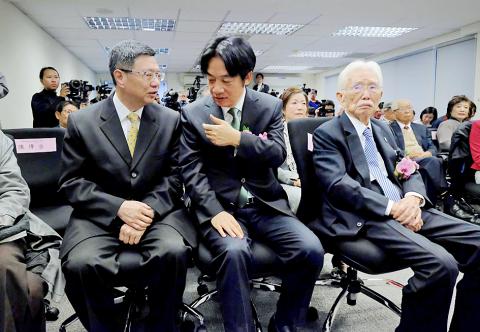At yesterday’s opening ceremony for his Taiwan New Constitution Foundation, Taiwanese independence advocate Koo Kwang-ming (辜寬敏) said that a new constitution is needed to give Taiwanese a sense of nationhood.
The “status quo” in Taiwan’s relationship with China is disadvantageous to Taiwan, Koo said, adding that through the foundation, he would promote the drafting of a new constitution.
National Taiwan University honorary professor of law Lee Hung-hsi (李鴻禧) likened the Republic of China Constitution to Taiwanese folk monster Moxina (魔神仔), which legend says dwells in the wilderness and causes trouble and confusion for people who come near.

Photo: CNA
The Constitution is meaningless, but causes all sorts of problems for Taiwan, he said.
Several prominent Taiwanese independence supporters attended the opening ceremony, including former premier William Lai (賴清德), Taiwan New Century Foundation chairman Chen Lung-chu (陳隆志), Taiwan Forever Association president Jerry Cheng (鄭文龍), New Power Party Executive Chairman Huang Kuo-chang (黃國昌), Social Democratic Party convener Fan Yun (范雲) and Taiwan Radical Wings Chairman Chen Yi-chi (陳奕齊).
The idea of drafting a new constitution tailored for Taiwan has been publicly discussed for more than a decade, Koo said.
Taiwan’s relationship with China and other countries is unstable, but at the US’ behest, presidents have been compelled to maintain the “status quo,” which has limited the nation’s participation in the international community, he said.
Taiwan is qualified to join the UN, but is prevented from doing so by the “status quo,” and only had to leave the international organization because Chiang Kai-shek (蔣介石) refused to participate alongside Beijing, he added.
Nevertheless, Taiwan has made outstanding achievements and contributions worldwide, Koo said, adding that a new constitution should be drafted so that the nation can formally participate in international organizations.
“China’s actions toward Taiwan are increasingly unreasonable and without consensus, which is causing change in Taiwanese society,” he said, adding that the Democratic Progressive Party’s (DPP) losses in the nine-in-one elections on Nov. 24 last year were due to its failure to address public dissatisfaction with the “status quo.”
Despite the enactment of the Taiwan Relations Act, Washington’s main focus has always been its relationship with China, Koo said, adding that Japan has had the same priority.
“Taiwan is progressing every day. What is the meaning of [the US telling Taiwan to] maintain the ‘status quo?’” he said.
The DPP has long advocated for the formulation of a new constitution, Lai said, citing former Presidential Office adviser Peng Ming-min’s (彭明敏) platform when he ran for president in 1996.
Then-president Chen Shui-bian (陳水扁) in 2004 called for a referendum on the issue of a new constitution and other parties have since then appealed for a new constitution, he said.
“Unfortunately, advocacy remains stuck at the point of advocacy, opinions remain simply opinions. The issue has not developed to the next step,” Lai said.
“Seeing the Taiwan New Constitution Foundation being formally established today, I personally respect Koo Kwang-ming greatly for his willingness to put his time and money into it,” he added.
A new constitution tailor-made for Taiwan is needed, because the current one was written in China and not with Taiwan in mind, Lai said, adding that Chinese values represented by the Constitution often conflict with modern Taiwanese values.
Although the Constitution was amended in 1996, a number of problems have emerged since then that have not been addressed, he said.
Taiwan must solve the issue of being an unrecognized nation, but this cannot be solved by one party alone, Lai said, adding that the nation’s political parties have not formed a culture that prioritizes national interests.
A new constitution could bring Taiwanese together, without which the nation cannot progress, cannot overcome failure in the international community and cannot face China, he said.

TRAGEDY: An expert said that the incident was uncommon as the chance of a ground crew member being sucked into an IDF engine was ‘minuscule’ A master sergeant yesterday morning died after she was sucked into an engine during a routine inspection of a fighter jet at an air base in Taichung, the Air Force Command Headquarters said. The officer, surnamed Hu (胡), was conducting final landing checks at Ching Chuan Kang (清泉崗) Air Base when she was pulled into the jet’s engine for unknown reasons, the air force said in a news release. She was transported to a hospital for emergency treatment, but could not be revived, it said. The air force expressed its deepest sympathies over the incident, and vowed to work with authorities as they

A tourist who was struck and injured by a train in a scenic area of New Taipei City’s Pingsi District (平溪) on Monday might be fined for trespassing on the tracks, the Railway Police Bureau said yesterday. The New Taipei City Fire Department said it received a call at 4:37pm on Monday about an incident in Shifen (十分), a tourist destination on the Pingsi Railway Line. After arriving on the scene, paramedics treated a woman in her 30s for a 3cm to 5cm laceration on her head, the department said. She was taken to a hospital in Keelung, it said. Surveillance footage from a

BITTERLY COLD: The inauguration ceremony for US president-elect Donald Trump has been moved indoors due to cold weather, with the new venue lacking capacity A delegation of cross-party lawmakers from Taiwan, led by Legislative Speaker Han Kuo-yu (韓國瑜), for the inauguration of US president-elect Donald Trump, would not be able to attend the ceremony, as it is being moved indoors due to forecasts of intense cold weather in Washington tomorrow. The inauguration ceremony for Trump and US vice president-elect JD Vance is to be held inside the Capitol Rotunda, which has a capacity of about 2,000 people. A person familiar with the issue yesterday said although the outdoor inauguration ceremony has been relocated, Taiwan’s legislative delegation has decided to head off to Washington as scheduled. The delegation

Another wave of cold air would affect Taiwan starting from Friday and could evolve into a continental cold mass, the Central Weather Administration (CWA) said yesterday. Temperatures could drop below 10°C across Taiwan on Monday and Tuesday next week, CWA forecaster Chang Chun-yao (張竣堯) said. Seasonal northeasterly winds could bring rain, he said. Meanwhile, due to the continental cold mass and radiative cooling, it would be cold in northern and northeastern Taiwan today and tomorrow, according to the CWA. From last night to this morning, temperatures could drop below 10°C in northern Taiwan, it said. A thin coat of snow